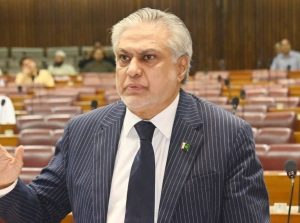In anticipation of an IMF agreement, the National Assembly has approved a new budget.
Budget changes include more money for pensions and the National Financial Competency Award, bringing the total to Rs14.48 trillion.

The Finance Bill 2023-24, with a revised outlay of Rs14.48 trillion, was approved by the National Assembly on Sunday in ISLAMABAD, with some adjustments to the proposed budgetary measures.
Added to the original law that was introduced on June 9 were new levies totaling Rs215 billion. The legislation established a GDP growth objective of 3.5 percent.
Finance Minister Ishaq Dar’s bill was supported by a majority of lawmakers and ultimately passed through the House. As the budget was passed, the banging of desks could be heard throughout the room. Now that it has the president’s stamp of approval, the Finance Act will become law on July 1.
Dar, in a last-ditch effort to get a long-delayed rescue package from the International Monetary Fund (IMF), announced fiscal modifications costing Rs300 billion, which were accepted the day after Dar’s budget.
Dar’s announcement of fresh measures as the budget debate came to a close indicated that the government had agreed most of the IMF’s demands, such as raising taxes on the salaried class and ending the $100,000 asset-whitening plan.
In light of Rs215 billion in additional taxes, the Federal Board of Revenue (FBR) saw a need to increase its revenue collection objective in the approved Finance Bill.
Budget increases for the Benazir Income Support Programme (BISP), the National Finance Commission (NFC) payment to the provinces, and the pensions of retired government employees were all approved by the House.
The federal excise duty (FED) on fertiliser was raised from 5% to 5%, while the FED on juices was raised from 10% to 20%, among other changes. The tax rate on property sales and purchases was also increased from 1% to 2%.
The Petroleum Development Levy Ordinance was revised to raise the maximum PDL rate from Rs50 per litre to Rs60 per litre.
As of January 1, both old-technology fans (taxed at Rs2,000) and old-technology light bulbs (20% tax) were subject to a tax.
The budget law was amended to create a three-person committee to resolve disputes over Rs3,200 billion, or the equivalent of 62,000 unresolved cases.
These changes include an increase from Rs761 billion to Rs801 billion for pension funds, an increase from Rs5,276 billion to Rs5,390 billion for the NFC Award, and an increase from Rs459 billion to Rs466 billion for the BISP allocation.
The Finance Bill was amended nine times, eight times by members of the Treasury and once by the opposition. A proposal from Jamaat-e-Islami member Maulana Abdul Akbar Chitrali was shot down in the House.
Claiming that the Finance Bill was based on the usury system, Chitrali insisted that it be presented to the Council of Islamic Ideology (CII). He claimed that the government was rejecting the ruling of the Federal Shariat Court (FSC) to outlaw usury by passing the measure.
Speaker Raja Pervaiz Ashraf, who presided over the meeting, put the idea to a vote. On this issue, all members of both the administration and the opposition, with the exception of Chitrali, voted against the motion to consult CII on the Finance Bill.
Over 973 billion for the fiscal 2021-22 and over 608 billion for the fiscal 2022-23 supplementary budgets were approved by the parliament. Dar made the announcement of the honorarium for the budget session personnel at the time.
Retirement Plan
Dar made it clear during the meeting that government officers in grades 17–22 would not be eligible for a double pension. He did emphasise, though, that government workers younger than Grade 17 would be exempt from the rule.
As Water Resources Minister Syed Khursheed Shah pointed out, some officers may have to choose between two pensions if they continue to work on a contract basis after retirement.
Dar noted that pension payments to surviving spouses and children of deceased retirees are not guaranteed to be made within a certain time limit. However, this was now only valid for a period of 10 years.
He emphasised the importance of these changes by noting that the pension budget has risen to Rs800 billion, or roughly 50% more than it was just a few years ago. He warned that pensions will collapse unless the changes being made.
The minister reassured Grand Democratic Alliance (GDA) member Ghous Bux Mahar that the government’s goal was to encourage local fertiliser production in response to his concerns about the removal of the urea subsidy.
He stated that more than $200 million would be invested by multiple Pakistani firms into the urea producing industry. He promised the chamber that agricultural concerns will be addressed after appropriate deliberation.
In light of the persistent problems in the Federally Administered Tribal Areas (Fata), Minister of Communication Asad Mehmood has called for a full assessment of the merger.
The minister stressed the importance of holding a referendum to find out what the people of Fata want. He continued by saying that development had been seen in Fata, but that it was essential to learn from locals about the challenges they confront.
Maulana Chitrali voted against the budget because he felt the House had not been kept informed about the increased taxes. He continued by saying the budget will cause an inflationary upheaval in the country.
Only Maulana Chitrali, a lone opposition member, and 62 treasury parliamentarians were present near the end of the session. The meeting was later deferred till Monday night.









































